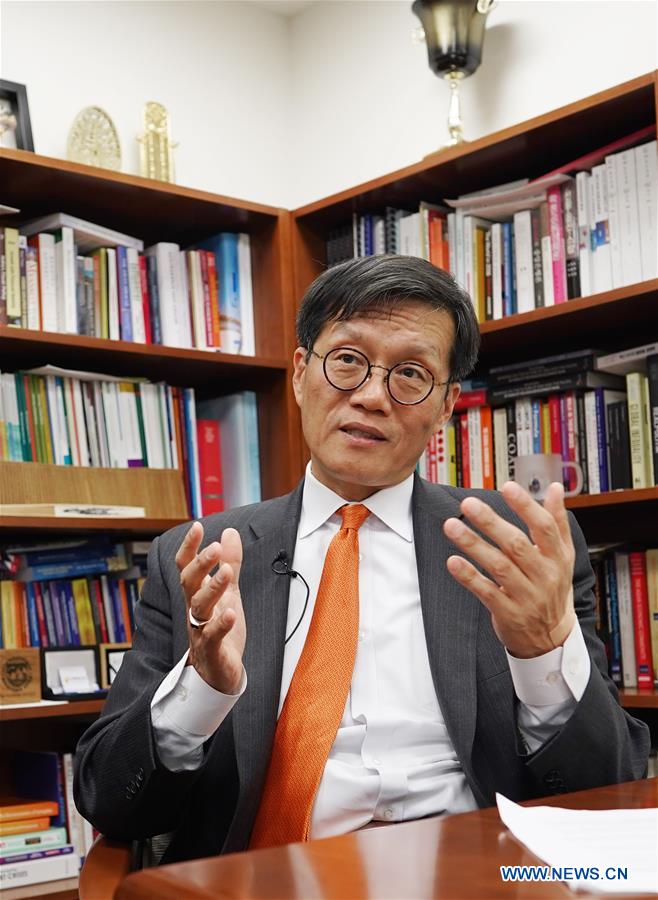
Changyong Rhee, director of the Asia and Pacific Department at the International Monetary Fund (IMF), speaks during an interview in Washington D.C., the United States, April 2, 2019. The China-proposed Belt and Road Initiative (BRI) is a "very important contribution" to the global economy, Changyong Rhee said. (Xinhua/Liu Jie)
WASHINGTON, April 11 (Xinhua) -- The China-proposed Belt and Road Initiative (BRI) is a "very important contribution" to the global economy, the Director of the Asia and Pacific Department at the International Monetary Fund (IMF) Changyong Rhee said.
The BRI has benefited the world in fostering infrastructure need in the low-income countries and also promoting regional cooperation and connectivity in trade investment, human mobility and finance, Rhee told Xinhua in a recent interview on the sidelines of the Spring Meetings of the IMF and the World Bank.
Rhee said he looks forward to participating in the second Belt and Road Forum for International Cooperation together with IMF managing director Christine Lagarde in Beijing later this month. Representatives from over 100 countries, including about 40 leaders of governments, have confirmed their attendance.
"The IMF is in very close collaboration with the Chinese authorities on sharing the best international practices, especially regarding fiscal sustainability and capacity building," not only for Chinese officials, but also for officials from low-income countries that have joined in the BRI, the IMF official said.
He said the IMF has opened the China-IMF Capacity Development Center in Beijing in order to provide personnel training, support institution building and boost communication for countries along the Belt and Road.
The IMF on Tuesday revised up the 2019 growth projection for China to 6.3 percent, up 0.1 percentage point from its previous estimation in January, according to the newly released April 2019 World Economic Outlook.
Rhee told Xinhua that the upward revision reflected the combined impact of recent developments in the China-U.S. trade talks, China's stronger-than-expected expansionary fiscal policy, and a slowing global economy.
The IMF made the latest projection taking into account both positive and negative factors, he said.
The forecast falls in the range of China's gross domestic product growth target of 6-6.5 percent this year, which was set in the latest annual government work report released in early March.
"We welcome Chinese government's recent announcement in growth target in the form of a range, not a point target," Rhee said. "I think that is quite consistent with the authorities' emphasis on the quality of growth rather than just maintain high quantity growth."
Rhee also said as China becomes wealthier, its growth rate will "naturally" go down.
With a slowing growth rate yet "a bigger pie," China's contribution to the global economy will be larger, Rhee said, adding that China is expected to account for more than 30 percent of global growth this year.
The IMF projects that the Asian economies will grow 5.4 percent in 2019 and 2020, accounting for more than 60 percent of the global growth. "So I can say that Asian economies are still resilient and also at the center of the global growth," he said.
Rhee also lauded China's efforts to open up its financial sector, and encouraged the country to continue developing its capital market to support its economic growth in the long run.
Currently, the banking sector plays a dominant role in the financial sector, and China needs the capital market to complement the banking sector, Rhee said, adding that the bond market development is a "good starting point."
Starting April, China's yuan-denominated bonds have been added to the Bloomberg Barclays Global Aggregate Index, which is expected to attract foreign inflows into the Chinese bond market and foster a further opening-up of the country's financial sector.
According to a newly-released report from the Institute of International Finance, China attracted large portfolio inflows last year, with its bond market bringing in 100 billion dollars in 2018, up from 88 billion dollars in 2017.
Highlighting the importance of foreign participation in China's bond market, Rhee said it not only can improve the efficiency of the market, but also is expected to serve the Chinese economy in the long term, as a good instrument to mobilize capital from abroad as its population ages and its current account becomes small or negative.
A well-developed bond market will also contribute to the internationalization of the Renminbi, Rhee said.
